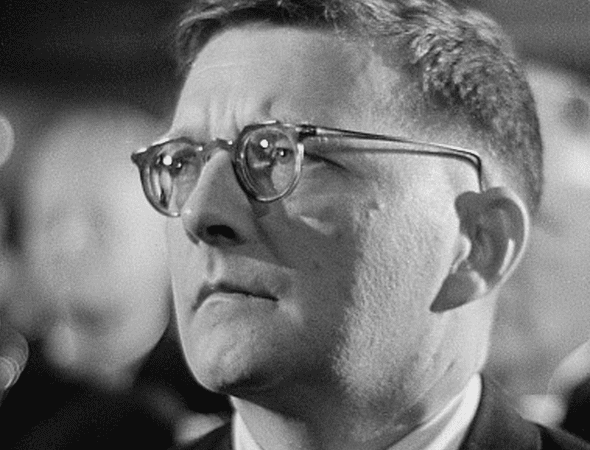SHOSTAKOVICH: Symphony No. 5
by Jeff Counts
THE COMPOSER – DMITRI SHOSTAKOVICH (1906–1975) – Shostakovich had been leading a fitful but successful life in the Soviet Union in January 1936 when he read the now famous article in Pravda that changed everything in his world. Stalin had just attended a performance of Lady Macbeth of the Mtsensk District and the “anonymous” Pravda condemnation made it clear that the Party elite was not at all pleased with what they heard. They called it “muddle instead of music,” focusing harshly on the questionable morality of the adulterous and murderous lead character, and their critique held potentially deadly implications. Thankfully the ultimate hammer didn’t fall, but Lady Macbeth would not be permitted on any Soviet stage for nearly three decades.

Deutsche Fotothek, CC BY-SA 3.0 DE, via Wikimedia Commons
THE HISTORY – An equally bitter pill was fed to Shostakovich when many of his composer colleagues turned on him and participated in the public disapproval of the opera. By doing so, and ingratiating themselves so shamelessly to Stalin, his “friends” made him a target for significant public condemnation. He remained mostly silent on the topic, but Shostakovich was still concerned enough for his personal safety that he withdrew his edgy 4th Symphony and hid it away for 25 years in fear of offending Stalin further. What followed was a moment of redemption that is as famous now as the fall from grace that necessitated it, even if the true intentions of the redeemed remain at the core of one of the great running debates in music history. The 5th Symphony, perhaps by virtue of its “simplified” language, appeared to signal to the Party that a significant rehabilitation had occurred. Looking back, it seems like an odd message for them to have received, given the symphony’s lack of overt patriotism and rather sullen slow movement. It is possible that the rapturous audience reaction created a propaganda problem for the Party leadership. How could they further denounce a man who had just elicited a 40-minute ovation, from the very people they were trying to protect from his avant-garde depredations? Did the immediate success force them to ignore some veiled insolence in the 5th Symphony in favor of a politically convenient acceptance of apology? There it is. The central mystery. Rostropovich reportedly believed that the piece would have gotten Shostakovich killed if not for the thunderous response of the listeners at the premiere. So, did Shostakovich outsmart Stalin or simply give him what he wanted? It is quite possible that with this mighty masterpiece Shostakovich somehow did one thing while secretly encouraging the other, and that “A Soviet Artist’s Creative Reply to Just Criticism” can be quite creative indeed.
THE WORLD – Elsewhere in 1937, Japan invaded China, the Hindenburg Disaster occurred in May, Amelia Earhart disappeared in July, and notable publications included The Hobbit, Of Mice and Men, and To Have and Have Not.
THE CONNECTION – Symphony No. 5 is part of the Utah Symphony’s regular repertoire and has been programmed many times over the years, most recently in 2012 under Andrey Boreyko.












